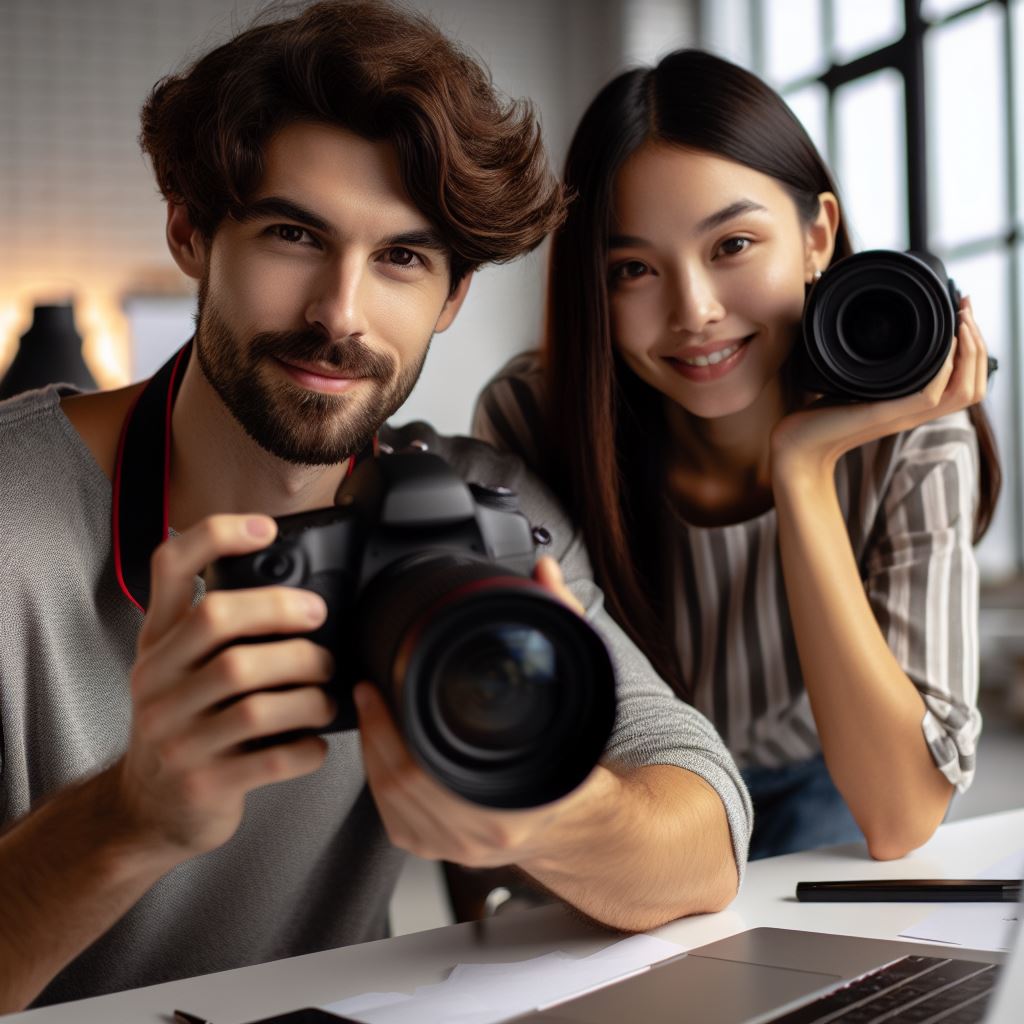Introduction
Portrait photography plays a crucial role in capturing the essence of individuals and preserving memories in Australia. It is a form of artistic expression that documents the unique stories and personalities of people.
In this blog post, we will explore the significance of portrait photography in Australia and discuss the various trends and techniques that are currently prevalent in the industry.
Importance of portrait photography in Australia
Portrait photography holds immense importance in Australia as it allows individuals to showcase their identity, emotions, and experiences. It serves as a way to remember special moments and celebrate milestones.
Moreover, portraits can also be used for professional purposes, such as corporate headshots or LinkedIn profiles, helping individuals establish their personal brand and make a lasting impression.
Overview of the blog post content
This blog post will delve into the various aspects of portrait photography in Australia. We will explore the emerging trends, including outdoor natural light photography, minimalistic compositions, and candid shots.
Additionally, we will discuss the impact of social media platforms on the photography industry, as well as the growing demand for customized portrait sessions that cater to specific preferences and themes.
Furthermore, we will touch upon the techniques used by portrait photographers to create captivating and visually stunning images.
This will include the use of different lighting setups, posing techniques, and editing styles that enhance the overall aesthetic appeal of the portraits.
As we delve into the world of portrait photography in Australia, we hope to inspire and enlighten both aspiring photographers and individuals seeking professional portraits.
Through this exploration, we aim to showcase the beauty and diversity that lies within portrait photography and its significance in capturing the essence of individuals and moments in Australia.
Historical Background of Portrait Photography in Australia
Early Days of Portrait Photography in Australia
Portrait photography in Australia has a rich history that dates back to the early 19th century.
It was during this time that the first photographic studio, known as the Daguerreian, opened in Sydney.
These studios primarily focused on capturing formal portraits of individuals and families.
Influences and Trends from the Past
The early days of portrait photography in Australia were heavily influenced by European styles.
Photographers from Europe brought with them the latest techniques and trends in portrait photography.
One such trend was the use of elaborate backdrops, props, and clothing to enhance the portraits.
Evolution of Portrait Photography in Australia
The Rise of Studio Portraits
As the art of portrait photography gained popularity in Australia, studios began to proliferate.
These studios offered a controlled environment where photographers could manipulate lighting and composition.
The focus was on creating flattering portraits that highlighted the subject’s best features.
The Emergence of Natural Light Portraits
In the late 19th and early 20th centuries, a new trend emerged in portrait photography.
Photographers started incorporating natural light into their portraits, creating a more relaxed and authentic atmosphere.
This style of photography captured the subject in their natural environment, often outdoors.
Contemporary Trends in Portrait Photography in Australia
The Advent of Digital Photography
With the advent of digital photography, portrait photography in Australia underwent a significant transformation.
Digital cameras allowed photographers to experiment with different techniques and styles.
Photos could now be instantly previewed and edited, giving photographers greater creative control.
The Rise of Candid Portraits
In recent years, there has been a shift towards candid portraits in Australia.
Photographers aim to capture genuine emotions and moments instead of posed and formal shots.
This trend has gained popularity as people seek more authentic and story-driven portraits.
The Influence of Social Media
In this digital age, social media platforms like Instagram have played a crucial role in shaping portrait photography trends.
Photographers now strive to create visually appealing and shareable portraits that stand out on social media feeds.
The popularity of filters and editing tools has also influenced the aesthetics of portrait photography.
The Future of Portrait Photography in Australia
Exploring New Technologies
As technology continues to advance, portrait photographers in Australia are embracing new tools and techniques.
From drone photography to virtual reality, these innovative technologies offer exciting possibilities for future portrait trends.
Photographers are constantly pushing boundaries and experimenting with unconventional approaches.
Embracing Diversity and Inclusivity
The future of portrait photography in Australia lies in embracing diversity and inclusivity.
Photographers are recognizing the importance of capturing portraits that represent the multicultural and diverse society.
This shift towards inclusivity ensures that a wide range of voices and stories are celebrated through portrait photography.
In essence, the historical background of portrait photography in Australia reveals the evolution of trends and influences.
From the early days of European styles to the contemporary trends shaped by social media, portrait photography continues to evolve.
With the rise of digital photography and the emergence of new technologies, the future of portrait photography in Australia looks promising.
As photographers embrace diversity and inclusivity, we can expect a more dynamic and representative portrayal of Australian society through portraits.
Your Personalized Career Strategy
Unlock your potential with tailored career consulting. Get clear, actionable steps designed for your success. Start now!
Get StartedTraditional Portrait Photography Techniques
In Australia, traditional portrait photography techniques still play a significant role in capturing memorable moments.
These techniques involve classic lighting setups and poses, emphasizing emotions and expressions, and paying attention to composition and background.
Classic lighting setups and poses
Classic lighting setups are essential in achieving the desired mood and ambiance in portrait photography. Photographers use various lighting techniques such as Rembrandt lighting, butterfly lighting, and loop lighting to create dramatic effects.
These setups involve positioning the light source at specific angles to highlight the subject’s features and add depth to the image.
Posing is another crucial aspect of traditional portrait photography. Photographers guide their subjects to achieve flattering poses that accentuate their best features.
Classic poses like the three-quarters pose, head tilt, or leaning against a prop are commonly used to create visually appealing portraits that stand the test of time.
Emphasizing emotions and expressions
In traditional portrait photography, emotions and expressions play a significant role in capturing the essence of the subject. Photographers strive to evoke genuine emotions and capture fleeting expressions that tell a story.
By connecting with their subjects and creating a comfortable environment, photographers can elicit natural and authentic emotions, resulting in timeless portraits.
Attention to composition and background
Composition and background are two elements that can make or break a portrait. Attention to detail in composing the image is crucial. Photographers consider factors such as the rule of thirds, leading lines, and balance to create visually pleasing portraits.
Additionally, the choice of background can enhance the subject and add depth to the image. Simple backgrounds or carefully selected locations can help focus attention on the subject and eliminate distractions.
Despite the rise of modern trends, traditional portrait photography techniques continue to hold their ground in Australia. These techniques are valued for their ability to create timeless and artistic portraits that capture the essence of the subject.
They allow photographers to create images that stand out from the crowd and evoke emotional responses from viewers.
To summarize, traditional portrait photography techniques in Australia focus on classic lighting setups and poses, emphasizing emotions and expressions, and paying attention to composition and background.
These techniques enable photographers to create timeless and visually appealing portraits that evoke emotions.
In a world of constantly changing trends, traditional portrait photography techniques remain relevant and cherished by both photographers and their subjects.
Evolution of Portrait Photography Styles
- Portrait photography has come a long way since its inception, evolving alongside changing societal norms.
- Initially, traditional portrait photography emphasized formal poses and rigid compositions.
- Over time, photographers began experimenting with new styles and techniques to capture genuine emotions and expressions.
- The shift from stiff, posed portraits to more natural and candid shots revolutionized the art of portrait photography.
Modern Portrait Photography Trends
- In recent years, modern portrait photography in Australia has seen a surge in popularity.
- Contemporary photographers strive to capture the essence of their subjects, often opting for unconventional compositions.
- The emphasis is on creating images that reflect the personality and individuality of the person being photographed.
- Utilizing unique backdrops, props, and lighting techniques, modern portrait photography aims to convey a story or evoke a specific mood.
Breaking Traditional Norms and Experimenting
- Breaking free from traditional norms, portrait photographers now explore unconventional angles and compositions.
- They experiment with unique poses, encouraging their subjects to be more relaxed and spontaneous.
- Unusual locations and unorthodox props are employed to add depth and interest to the portraits.
- These daring approaches have led to refreshing and dynamic portraits that captivate viewers, evoking curiosity and intrigue.
Impact of Social Media on Styles and Trends
- Social media platforms like Instagram and Facebook have revolutionized the way portrait photography is consumed and shared.
- Photographers now create content that is tailored for social media, each image designed to stand out in a crowded digital landscape.
- The “selfie” culture has also heavily influenced portrait photography, as people strive to portray themselves in the best possible light online.
- Social media platforms have provided a platform for photographers to showcase and promote their work, allowing trends to spread quickly and widely.
Essentially, portrait photography in Australia has witnessed an evolution in styles and trends.
Photographers have moved away from traditional norms and embraced experimentation, resulting in captivating and unique portraits.
The influence of social media has further propelled these changes, shaping the way portrait photography is created and consumed.
With the constant evolution of technology and societal expectations, it will be fascinating to see where portrait photography in Australia will go next.
Read: How to Network in Australia’s Music Scene
Popular Portrait Photography Genres in Australia
Portrait photography has become increasingly popular in Australia, with various genres gaining attention among photographers and clients alike.
In this section, we will explore the different portrait photography genres that have emerged as significant trends in the country.
Family Portraits
Family portraits have always been a classic genre in portrait photography, and they continue to be immensely popular in Australia.
These sessions capture the essence of familial relationships, creating meaningful and timeless images that families can cherish for years to come.
Professional Headshots
In today’s digital age, the demand for professional headshots has skyrocketed.
These portraits are crucial for individuals seeking to establish their online presence, whether it be for job applications, professional networking, or social media platforms like LinkedIn.
Maternity and Newborn Portraits
Capturing the beauty of pregnancy and newborns is a precious and cherished genre of portrait photography.
Maternity portraits celebrate the glow and anticipation of expectant mothers, while newborn portraits capture the innocence and delicacy of a newborn baby.
Wedding and Engagement Portraits
Wedding and engagement portraits hold immense sentimental value for couples, as they capture their love and commitment during this special time in their lives. These portraits often showcase the couple’s personalities and their unique connection.
Stand Out with a Resume That Gets Results
Your career is worth more than a generic template. Let us craft a resume and cover letter that showcase your unique strengths and help you secure that dream job.
Get HiredIn addition to these popular genres, there are also emerging trends within the field of portrait photography in Australia.
Lifestyle Portraits
Lifestyle portraits aim to document genuine and candid moments in people’s lives. These portraits focus on capturing individuals or families in their natural environments, such as their homes or favorite outdoor locations.
Fine Art Portraits
Fine art portraits take a more artistic approach, often incorporating creative lighting, poses, and post-processing techniques. These portraits aim to capture the subject’s personality and emotions in a unique and visually stunning way.
Pet Portraits
As pets are considered part of the family in many households, pet portraits have gained significant popularity. These portraits showcase the bond between owners and their beloved pets, immortalizing their furry companions in beautiful images.
Creative Portraits
Creative portraits allow photographers to showcase their artistic vision and experiment with different techniques and concepts.
These portraits often involve dramatic lighting, unique props, and imaginative post-processing to achieve a distinctive and eye-catching result.
The popularity of portrait photography in Australia is not only driven by individuals seeking to capture significant milestones in their lives but also by the increasing recognition of the artistry and skill involved in creating captivating portraits.
Whether it is a family portrait, a professional headshot, or a creative concept, portrait photography continues to evolve and thrive in Australia, offering a variety of options for clients to express their individuality and preserve their memories.
Read: The Evolution of Australian Music Genres
Equipment and Tools for Portrait Photography
Portrait photography has become increasingly popular in Australia, with photographers constantly seeking new trends and techniques to enhance their work.
One key aspect of capturing stunning portraits is having the right equipment and tools. In this section, we will explore the essential gear needed for portrait photography and how it can elevate your images.
Cameras and lenses suitable for portrait photography
- A full-frame DSLR camera is the preferred choice among professional portrait photographers. The larger sensor allows for better image quality and control over depth of field.
- Prime lenses with wide apertures, such as the 85mm or 50mm, are commonly used for portraits. These lenses create a pleasing bokeh effect and produce sharp, detailed images.
- Telephoto lenses like the 70-200mm are ideal for capturing portraits from a distance, enabling photographers to focus on facial expressions without being intrusive.
Lighting equipment options
- Natural light can produce stunning results for portraits. Consider shooting during golden hour when the soft, warm light creates a flattering glow on the subject’s face.
- For indoor or low-light situations, a versatile lighting setup is essential. A basic kit should include a speedlight or strobe, light stands, umbrellas, and softboxes.
- Continuous lighting options, such as LED panels or ring lights, are popular choices for portrait photography as they provide a constant light source and allow for easy adjustments.
Use of props and accessories
- Props and accessories can add character and interest to a portrait. Consider using items that reflect the subject’s personality or tell a story.
- Simple props like flowers, hats, or books can provide visual elements that enhance the composition and add depth to the image.
- Accessories like scarves, jewelry, or sunglasses can be used to accentuate the subject’s style and create a unique look.
By carefully selecting the right equipment and utilizing various tools, portrait photographers can elevate their work and stand out from the crowd.
Remember, equipment is just a tool, and it’s the photographer’s creativity and vision that truly make a portrait exceptional. Experimenting with different combinations of gear and techniques will help you find your signature style.
All in all, portrait photography in Australia has seen a surge in popularity, and staying updated with the latest trends and techniques is crucial for photographers.
Investing in the right cameras and lenses, choosing suitable lighting equipment, and incorporating props and accessories can greatly enhance the quality and uniqueness of your portraits.
Ultimately, it is the photographer’s skills and creativity that will capture the essence of their subject and produce portraits that resonate with viewers.
So, grab your gear, step out of your comfort zone, and explore the beautiful world of portrait photography.
Read: Building a Music Career in Australia

Technological Advancements in Portrait Photography
Digital Editing and Retouching Techniques
- High-end digital cameras allow photographers to capture stunning details in portraits.
- Advanced editing software like Adobe Photoshop enables photographers to enhance the quality of their portraits.
- Digital editing allows photographers to remove imperfections, adjust colors, and enhance overall composition.
- Retouching techniques help photographers create flawless skin, remove blemishes, and improve facial features.
- The ability to digitally retouch portraits has revolutionized the industry and increased creativity.
Smartphone Photography and Apps for Portraits
- The rise of smartphones has made photography more accessible, including portrait photography.
- Smartphone cameras have become increasingly advanced, offering high-resolution images for portraits.
- Various photography apps provide filters, effects, and editing tools specifically designed for portraits.
- Applications like Instagram and Snapchat allow users to share portrait photos instantaneously.
- Smartphone photography and apps have allowed individuals to experiment with portrait photography without expensive equipment.
Virtual Reality and Augmented Reality in Portrait Photography
- Virtual reality (VR) and augmented reality (AR) technologies have begun to shape portrait photography experiences.
- VR allows photographers to create immersive environments for stunning portraits.
- AR overlays digital elements onto real-world scenes, enhancing the storytelling aspect of portraits.
- Portrait photographers can use VR and AR to transport their subjects into fantastical or historic settings.
- The combination of VR, AR, and portrait photography opens up new possibilities for creative expression.
Overall, technological advancements have greatly influenced the field of portrait photography in Australia. Digital editing and retouching techniques have allowed photographers to enhance their portraits and create flawless images.
Smartphone photography and apps have made portrait photography accessible to a wider audience, promoting creativity and sharing of these unique visual stories.
Additionally, the emergence of virtual reality and augmented reality technologies has introduced new dimensions to the art of portrait photography, allowing for immersive experiences and imaginative storytelling.
As technology continues to advance, the future of portrait photography in Australia looks promising and filled with endless possibilities.
Read: Australian Music Awards: A Closer Look
Emerging Trends in Portrait Photography
Fine art and conceptual portraiture
In recent years, there has been a growing trend in Australia towards fine art and conceptual portraiture.
Transform Your LinkedIn for Maximum Impact
Elevate your professional brand with a LinkedIn profile that attracts recruiters, showcases your expertise, and maximizes opportunities. Stand out in your industry with a profile built for success.
Boost ProfilePhotographers are using various techniques to create unique and visually captivating portraits that tell a story.
By incorporating elements of painting, sculpture, and other art forms, these portraits are transformed into works of art.
Photographers experiment with lighting, composition, and props to enhance the narrative and evoke emotions in the viewers.
These portraits often reflect the individuality and personality of the subject, capturing their essence in a creative and thought-provoking way.
Environmental and outdoor portraits
Another emerging trend in portrait photography is the focus on environmental and outdoor portraits.
Photographers are stepping out of the studio and into nature to capture subjects in their natural surroundings.
These portraits take advantage of natural light, scenic landscapes, and urban backdrops to create striking and authentic photos.
By incorporating the surrounding environment, the portraits gain an added dimension and enhance the overall mood and story.
These outdoor portraits offer a sense of freedom, capturing the subject in a more relaxed and spontaneous manner.
Minimalistic and black-and-white portraits
Minimalistic and black-and-white portraits have also gained popularity in the world of portrait photography.
These portraits strip away distractions, focusing solely on the subject and their expressions.
By eliminating color, the emphasis is placed on the subject’s features, emotions, and the overall composition of the photo.
The simplicity of these portraits allows for a deeper connection between the viewer and the subject.
The use of shadows, contrast, and textures adds depth and enhances the visual impact of these black-and-white portraits.
Natural and candid portraits
Lastly, natural and candid portraits are emerging as a popular trend in Australia.
Gone are the days of stiff poses and forced smiles; photographers now aim to capture genuine moments and emotions.
These portraits are unfiltered and raw, showcasing the subject’s true personality and allowing their true self to shine through.
Photographers often use documentary-style approaches, blending into the background and capturing candid moments.
These natural portraits create a sense of intimacy and authenticity, leaving a lasting impression on the viewer.
In fact, portrait photography in Australia is evolving with various emerging trends.
Whether it’s fine art, environmental, minimalistic, or natural portraits,
photographers are pushing boundaries and experimenting with different styles to create captivating and meaningful portraits.
Explore Further: Graphic Design: Trends in Australia
Prominent Portrait Photographers in Australia
Portrait photography is a popular genre in Australia, with many talented photographers making their mark in the industry.
In this section, we will discuss some of the prominent portrait photographers in the country, their unique styles, and their contributions to the field.
Anne Geddes
Known for her iconic images of babies, Geddes has achieved worldwide recognition for her whimsical and heartwarming portraits. Her photographs capture the innocence and beauty of newborns, making her an influential figure in the industry.
Bill Henson
Henson’s portraits often explore themes of adolescence and beauty, with a touch of darkness. His moody and atmospheric images have earned him international acclaim, making him one of the most revered photographers in Australia.
June Newton
Also known as Alice Springs, June Newton is a renowned portrait photographer who has captured the essence of numerous celebrities and artists.
She is recognized for her black and white portraits that showcase the vulnerability and personality of her subjects.
Tracey Moffatt
Moffatt’s work challenges stereotypes and addresses cultural and social issues through her compelling portraits. Her unique style blends photography with storytelling, creating powerful narratives that resonate with viewers.
Max Dupain
Considered one of Australia’s most influential photographers, Dupain’s portraits capture the essence of Australian identity. His iconic image, “Sunbaker,” is a powerful representation of the country’s relaxed lifestyle and love for the outdoors.
Polixeni Papapetrou
Papapetrou’s imaginative portraits often feature children immersed in otherworldly settings, blurring the lines between reality and fantasy. Her work explores themes of childhood, identity, and the natural world.
Carol Jerrems
Jerrems was a pioneering female photographer whose portraits reflected the changing social landscape of Australia in the 1970s. Her candid and intimate images capture the spirit of youth and rebellion during that era.
Trent Parke
With his unique use of light and composition, Parke’s portraits depict everyday life in a remarkable and poetic way. His captivating imagery often reveals the hidden beauty found in the ordinary.
Del Kathryn Barton
While primarily known for her contemporary art, Barton’s portraits integrate elements of painting and photography. Her vibrant and surreal images challenge traditional notions of portraiture and explore themes of femininity and identity.
Rennie Ellis
Ellis was a prolific Australian photographer whose portraits documented various subcultures and the changing social fabric of the country. His images capture a raw and unfiltered glimpse into Australian life.
These renowned photographers have significantly shaped the portrait photography industry in Australia.
Through their unique styles and compelling subjects, they have not only captured remarkable images but also pushed the boundaries of what portrait photography can be.
Their contributions continue to inspire both aspiring photographers and admirers of the art form, making Australia a hub of creativity and talent in the field of portrait photography.
Uncover the Details: Nature Photography: Australia’s Hidden Gems
Delve into the Subject: Australian Music Law: What You Need to Know
Explore Further: Investigative Reporting in Australia
Conclusion
We explored the rise of natural and candid portraits, the use of unique locations, and creative lighting techniques.
Additionally, we examined the popularity of black and white portraits and the influence of social media.
For aspiring photographers, this is an exciting time to explore and push their creativity in this field.
By embracing the trends and experimenting with their own style, they can stand out and make an impact in the industry.
It is important for photographers to constantly learn and adapt to stay relevant and innovative.
Whether it’s capturing emotions or telling stories, portrait photography offers endless possibilities for artistic expression.
By following these trends and thinking outside the box, photographers can create memorable and captivating portraits.
Ultimately, the future of portrait photography in Australia looks promising, and this is an exciting time to be a part of the industry.
So, aspiring photographers, don’t hold back! Let your creativity shine and capture stunning portraits that will leave a lasting impression.
With dedication and passion, you can carve a successful career in the world of portrait photography.
Embrace the trends, challenge yourself, and bring your unique vision to life in every shot.
Happy shooting!




